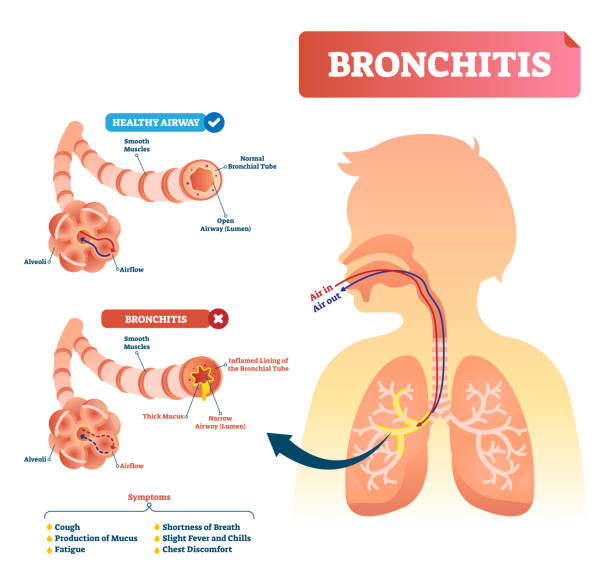What is Bronchitis?
Bronchitis is a condition in which the bronchial tubes, or airways, in the lungs become inflamed and filled with mucus. It is a common lung condition that can affect people of all ages. People who have bronchitis often experience a persistent cough that produces mucus, shortness of breath, chest discomfort, and wheezing.
Types of Bronchitis
There are two main types of bronchitis: acute and chronic.
-
Acute Bronchitis: This is the more common type of bronchitis and is usually caused by a virus or bacteria. It usually lasts for a few weeks and usually resolves itself without any medical treatment.
- Chronic Bronchitis: This type of bronchitis is usually caused by smoking or long-term exposure to air pollutants. It is a long-term condition that can lead to serious health complications if not treated properly.
Symptoms of Bronchitis
The most common symptom of bronchitis is a persistent cough that produces mucus. Other symptoms may include:
• Wheezing
• Shortness of breath
• Chest discomfort
• Fatigue
• Fever
• Chills
• Sore throat
• Body aches
Diagnosis and Treatment of Bronchitis
If you think you may have bronchitis, it is important to see a doctor for a proper diagnosis. Your doctor will listen to your lungs and ask about your symptoms and medical history. They may also recommend tests such as a chest X-ray or a blood test to confirm the diagnosis.
The treatment for bronchitis depends on the type and severity of the condition. Treatment may include antibiotics, cough suppressants, bronchodilators, and/or inhalers to help open your airways and make breathing easier. In some cases, your doctor may also recommend lifestyle changes such as quitting smoking and avoiding air pollutants.
Complications of Bronchitis
Bronchitis can lead to more serious health complications if left untreated. These can include pneumonia, lung damage, asthma, and COPD (chronic obstructive pulmonary disease). If you have any of these symptoms, it is important to seek medical attention right away.
Prevention of Bronchitis
The best way to prevent bronchitis is by avoiding exposure to air pollutants and irritants, such as cigarette smoke, chemical fumes, and dust. It is also important to get the flu vaccine each year to protect against viruses that can cause bronchitis.
Natural Remedies for Bronchitis
1. Honey: Honey is a natural cough suppressant and can help relieve symptoms of bronchitis, such as coughing, sore throat, and chest congestion. Take 1-2 teaspoons of honey three times a day to help soothe your throat and reduce inflammation.
2. Ginger: Ginger has natural anti-inflammatory properties that can help reduce inflammation in the lungs and bronchial tubes. Drink ginger tea or chew on fresh ginger slices to help reduce symptoms of bronchitis.
3. Turmeric: Turmeric is a powerful antioxidant that can help reduce inflammation and boost the immune system. Make a tea with turmeric and honey or add it to your favorite smoothie to help reduce symptoms of bronchitis.
4. Garlic: Garlic has natural antibiotic and anti-inflammatory properties that can help reduce inflammation in the lungs and bronchial tubes. Eat raw garlic or make garlic tea by adding a few cloves of garlic to boiling water and drinking it twice a day.
5. Eucalyptus Oil: Eucalyptus oil is a natural expectorant that can help clear mucus and open up the airways. Use a few drops of eucalyptus oil in a diffuser or add a few drops to your bathwater.
Conclusion
Bronchitis is a common lung condition that can affect people of all ages. It is important to seek medical attention if you think you may have bronchitis and to take steps to prevent the condition. If left untreated, bronchitis can lead to serious health complications.
Author: Nikita Vishnoi BCA













